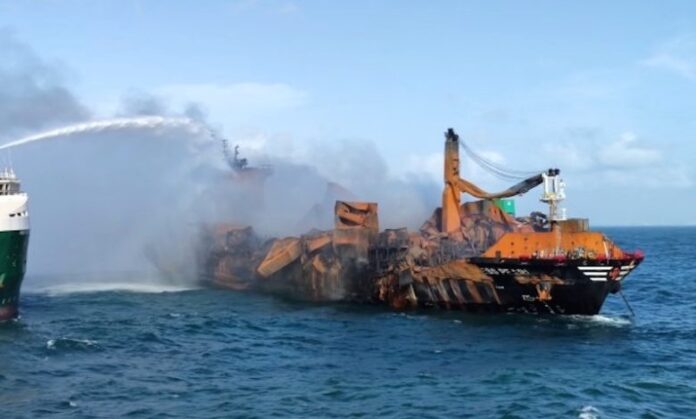By: Staff Writer
July 13, Colombo (LNW): The government is set to appoint a special committee within the next month to investigate alleged corruption and irregularities surrounding the legal proceedings linked to the X-Press Pearl maritime disaster, which caused one of the worst environmental crises in Sri Lanka’s history. This move was announced by Environment Minister Dhammika Patabendige.
The proposed committee will delve into the legal aftermath of the 2021 disaster, scrutinizing agreements made by the government and the effectiveness of compensation claims lodged on behalf of affected communities and the environment. It will also evaluate the controversial decision to permit the vessel’s entry into the Port of Colombo shortly before the incident.
The Singapore-flagged container ship X-Press Pearl caught fire and sank off the coast of Negombo on May 20, 2021, while carrying a cargo of hazardous chemicals including nitric acid and plastic pellets. The disaster caused widespread damage to marine ecosystems, polluted coastal waters, and devastated local fishing communities.
In its wake, thousands of complaints have been made regarding the government’s management of legal procedures and recovery of damages. Compensation efforts have been criticized for being inadequate. While the ship’s insurer has disbursed over Rs. 3,068 million for the fishing sector, only Rs. 1,463 million has been distributed so far across three rounds. A fourth round involving Rs. 1,605 million is expected soon, according to the Ministry of Fisheries.
However, environmental groups and legal experts argue that the insurance payout falls significantly short of the actual damages suffered. Legal action is still ongoing in Singapore and Australia, where Sri Lanka continues to push for a larger settlement.
In addition to economic losses, the ecological toll has been profound. Over 200 dead sea turtles were found along Sri Lanka’s coastline in the months following the incident. While some officials initially pointed to seasonal patterns during the ‘warakan’ monsoon period, investigations by the Department of Wildlife Conservation (DWC) confirmed that the deaths were directly linked to the toxic pollutants released from the burning and sinking vessel. Post-mortem reports showed traumatic brain injuries and other signs consistent with chemical exposure.
Former Coast Conservation Minister Nalaka Godahewa had initially downplayed the turtle deaths, citing the need to compare seasonal mortality statistics. However, expert findings have strongly implicated the maritime disaster.
The long-term environmental consequences remain a pressing concern. The incident led to the destruction of coral reefs, contamination of fishing areas, and significant marine biodiversity loss. More than 20,000 fishing families suffered livelihood disruptions, bringing renewed attention to the need for stronger maritime disaster preparedness and enforcement of environmental safeguards.
Environmentalists and maritime experts argue that Sri Lanka’s current legal and regulatory frameworks were ill-equipped to handle a disaster of this magnitude. The upcoming special committee is expected to recommend reforms to prevent similar disasters in the future and ensure transparency and accountability in legal proceedings.
With pressure mounting from civil society, legal circles, and affected communities, the government’s latest move may mark a crucial step toward justice and environmental restoration—if followed through with transparency and decisive action.

